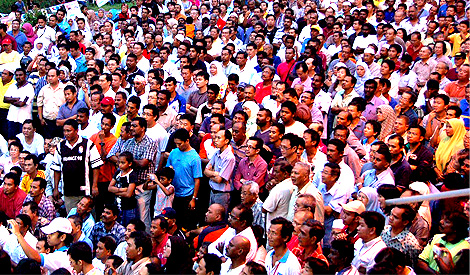Speaking at the national-level Malaysia Day 2016 celebration at the Bintulu Old Airport site on Sept 16, the Malaysian Prime Minister, Najib Abdul Razak, said Malaysia had faced many challenges and obstacles since the country’s formation 53 years ago but because of the people’s unity, had become strong and successful.
Malaysia will be a stronger nation if there is a greater sense of togetherness among the people and Malaysians must strive further to enhances the sense of togetherness by, among others, finding the points of similarity and moments of unity that could strengthen social unity.
It can be said that ‘togetherness’ is the pleasant feeling of being united with other people in friendship and understanding; the state of being close to another person or other people.
The popularised word ‘togetherness’ or ‘harmony’ suitably catches a general idea of human proximity, of meeting and speaking; be they families’ urban communities or the older universities, have institutions which promote togetherness.
On more or less ritualised occasions, and in the traditional places, humans converse; either verbally, or by image and gesture.
Then again there are additionally constraints upon ‘togetherness’; a lot of it, for instance. Offers ascend to particular manifestations of individual and social disquietude. These manifestations normally show up when the correspondence, permitted by nearness, is not under discussion.
One of the best-known and most widely-quoted texts of the ‘Critique of Pure Reason’ seen in The Togetherness Principle, or Kant’s Conceptualism, and Kant’s Non-Conceptual is this pithy slogan: “thoughts without content are empty, intuitions without concepts are blind”.
That slogan exemplifies what can be known as the togetherness principle. The ‘togetherness’ here is the essential subjective reciprocally and semantic relationship of instincts and ideas, when put against the setting of Kant’s psychological dualism of the resources of sensibility and understanding.
Togetherness does not mean doing ‘everything’ together, ‘constantly’. It means doing a few things together, in some cases. Also, these things change as well - things you delighted in doing together, you need to do only them sooner or later in life, and do more up to date things together.
Togetherness is a state, not a method for being, constantly. States change as people and their minds and world perspectives change. The worth and implications we give out to togetherness additionally change as our states change.
Building a one of a kind personality for you in the relationship is not contrary to togetherness. It is especially paired with togetherness for fellowship is not about choking out each other. It is about conveying uniqueness to the relationship and praising it.
Making a choice in accepting somebody is not a philosophical or emotional choice. It is a practical decision. And it is important to always be mindful of the practicality of this choice and put it into consideration in every decision you make for your choice and your relationship.
Different definitions of success
Definitions of success and therefore of identity are different for us because we are socialised in different ways. We struggle in our own ways to realise and maintain recognition and success because of different ways of gender socialisation and a number of other factors.
Be aware of the way that one individual’s success and acknowledgment in the relationship is not the subsumption of the other individual’s character. It implies that the other individual must be that much more grounded, flexible and secure about him or herself. What’s more, that is a hard test in light of the fact that the world is judgmental and savage in its judgments, and we are constantly determined by our ghosts - real and seen.
“Togetherness is cultivated when you involve yourself voluntarily and proactively, or share information or knowledge without being asked. There has to be an element of willing sacrifice.”
Individuals are different, some are expressive, others are held; some identify with others proactively, others hope to be welcomed; individuals vary by the way they imagine and how intelligent they are. So clashes are unavoidable. You require spaces at periodic intervals to help people work through differences.
Lastly, there is much to be said in regard to ‘pace’ and togetherness. Some way or other, pace seems to drive our connections in ways that we can see and ways we can’t see.
Pace, moving along in personal journeys and in the relationship (separately and together) has come to define togetherness as men and women almost equally inhabiting the domains of work and public life.
Pace is truly about who is ahead and behind with regards to perceivability, achievement, acknowledgment and desire. Such pacing sees someone as more problematic than empowering.
One has to be mindful of the pace at which one is moving, and the values that one attaches to success, glory and recognition - sometimes being able to given in (and therefore gain more) is a lot more wiser than resisting and fighting.


